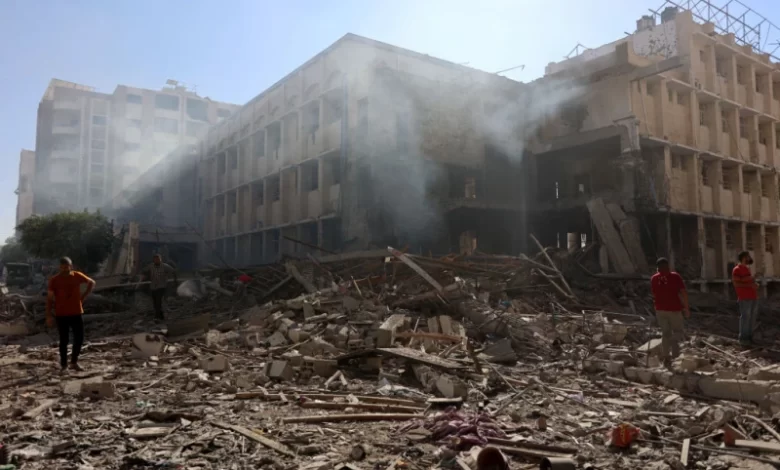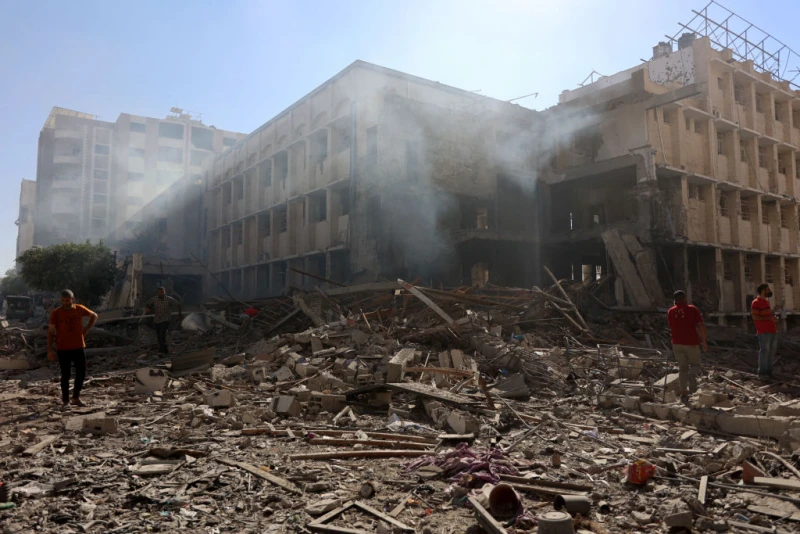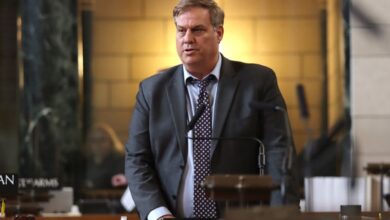Palestinian Christians double down on criticizing U.S. Catholic bishops on Israel, Zionism

 Palestinians stand on the rubble and debris of the Latin Patriarchate Holy Family School after it was hit during Israeli military bombardment in Gaza City on July 7, 2024, amid the ongoing conflict in the Palestinian territory between Israel and Hamas. / Credit: OMAR AL-QATTAA/AFP via Getty Images
Palestinians stand on the rubble and debris of the Latin Patriarchate Holy Family School after it was hit during Israeli military bombardment in Gaza City on July 7, 2024, amid the ongoing conflict in the Palestinian territory between Israel and Hamas. / Credit: OMAR AL-QATTAA/AFP via Getty Images Washington, D.C. Newsroom, Apr 16, 2025 / 18:36 pm (CNA).
An ecumenical Palestinian Christian organization doubled down on criticism of the United States Conference of Catholic Bishops (USCCB) this week, accusing the body of dismissing concerns of Palestinian Christians and portraying opposition to the Israeli government as antisemitic.
The organization, Kairos Palestine, is led by Catholic Patriarch Emeritus Michel Sabbah and is composed of Catholic, Orthodox, and Protestant Christian Palestinians. The group supports “nonviolent resistance” to Israeli policies in the Gaza Strip and the West Bank, which includes boycotts, divestment, and sanctions against Israel.
“As Palestinian Christians living through one of the darkest periods in our history, we are compelled to speak the truth,” Kairos Palestine’s leaders wrote in an April 14 letter to the USCCB.
The dispute between the two groups is rooted in the USCCB’s partnership with the American Jewish Committee (AJC) to create a Catholic edition of AJC’s “Translate Hate” document, which is meant to condemn antisemitism and educate Catholics on antisemitic phrases and beliefs.
Defining antisemitism
Kairos Palestine affirmed in a March 25 letter to the American bishops that “our criticisms of Israel’s policies and the actions of its leaders are not directed at Jewish communities or Judaism itself,” but it expressed disapproval of a few elements of the “Translate Hate” document related to Zionism and the State of Israel.
The document adopts the International Holocaust Remembrance Alliance (IHRA) definition of antisemitism, which states that manifestations of antisemitism “might include the targeting of the state of Israel” and lists as examples any claim that “the existence of a state of Israel is a racist endeavor” and the application of “double standards” against Israel. It notes that not all criticism of Israel, however, is antisemitic.
According to the “Translate Hate” document, the IHRA definition was used because alternative definitions defend “anti-Israel and anti-Zionist expressions” as not being forms of antisemitism.
Zionism refers to the political movement founded in 1897 aimed at creating a Jewish national homeland and a Jewish state in the Holy Land; international recognition was achieved in 1917 with the Balfour Declaration, followed by the creation of the State of Israel in 1948.
The “Translate Hate” document refers to anti-Zionism as “the belief that the Jewish people do not have the right to a national home in their ancestral homeland” and states that it is widely believed to be “a form of antisemitism.”
Additionally, the document states that calling Zionism inherently racist is antisemitic and alleging that Zionism is a form of “settler colonialism” with the mission of “ethnic cleansing” of Palestinian people is antisemitic and “categorically false.” It states that Jews are “native and indigenous to the land” and that Zionists “never had the goal of eliminating the Arab population living in the region.”
In its March 25 letter to the USCCB, Kairos Palestine referenced these aspects of the “Translate Hate” document as the reasons for their objections, asserting it “dangerously equates Zionism with Judaism” and ignores “overwhelming evidence” of an ethnic cleansing of Palestinians.
“It equates Palestinian resistance with antisemitism, a dangerous conflation that distorts reality and undermines legitimate criticism of Israeli racist laws and policies,” the Palestinian Christian group argued. “We categorically reject all forms of antisemitism, just as we reject any attempt to use this charge to justify oppression and to criminalize our legitimate struggle for our basic rights and our right for self-determination.”
Kairos Palestine’s letter says the USCCB “has alienated the indigenous Christians of the Holy Land, causing deep pain to a community struggling for survival” by signing onto this document and is “ignoring their unalienable rights to live in their ancestral homeland and offering the State of Israel a justification for their forced displacement.”
USCCB’s answer and Kairos Palestine’s response
Archbishop Timothy Broglio, the president of the USCCB, provided a response less than one week later on March 31, telling Kairos Palestine in a letter that the USCCB “partnered with the Jewish community … to develop a Catholic commentary on the Translate Hate educational resource authored by [AJC]” in response to rising antisemitism, the Oct. 7, 2023, Hamas attack on Israel and the subsequent Israeli invasion of Gaza.
“Here in our country, there are some who stand with Jewish Israelis and others who stand with Palestinians,” he continued. “Too often, people of a side or camp do not want to hear that our hearts are broken for all the lives that have been lost, all the worlds that have been destroyed. Empathy has thus become a further casualty of this war.”
Broglio wrote that the USCCB is also working on a document to combat Islamophobia with Muslim partners. He added that the USCCB does not try “to speak on behalf of Palestinian Christians” but rather speaks “to and on behalf of the Catholic community in the United States.”
“I know that, as Christians who have experienced great suffering yourselves, you understand the imperative to stand with all who suffer and to combat hatred wherever it is expressed,” he wrote.
The letter did not directly respond to the specific objections about the definition of antisemitism or the examples that Kairos Palestine criticized.
Kairos Palestine followed up with the USCCB this week, sending another letter calling Broglio’s response “unacceptable,” stating that “nowhere in the bishop’s letter is there any indication that the USCCB intends to ‘stand with’ their Palestinian siblings to prepare a document describing the extent of the suffering we are experiencing.”
“We are grieved and disheartened by the complete erasure of the Palestinian Christian voice in their response,” the Kairos Palestine leaders wrote.
“The Palestinian people in Gaza and in the West Bank are enduring what can only be described as a war of extermination, a genocide and ethnic cleansing,” they continued. “Entire families have been annihilated. Homes, churches, and hospitals have been destroyed. Over 50,000 people, the majority of whom are women and children, have been killed. This is not a conflict between equals. It is a campaign of destruction carried out by a powerful apartheid state, supported militarily and financially by the United States and a number of European countries.”
The follow-up letter accuses the Catholic Church in the United States of being “silent about this devastation” and asserts “it shares in the responsibility for our suffering.” It adds: “It is not enough to condemn hate. You must also condemn the systems and powers that perpetuate injustice.”
“We categorically reject the conflation of our legitimate struggle for freedom, dignity, and human rights with antisemitism,” they added. “We are not anti-Jewish, anti-Judaism, or anti-Semitic. We are a people resisting occupation, apartheid, and dispossession. Equating this with hatred is both theologically and morally wrong.”
CNA reached out to the USCCB for comment on Kairos Palestine’s April 14 response but did not receive a response by the time of publication.
Simone Rizkallah, the director of Philos Catholic at The Philos Project, told CNA the “Translate Hate” Catholic edition “is pastoral in nature and shows that the bishops are not tone deaf to the sufferings of our fathers in faith.” The Philos Project is a pro-Israel nonprofit that also works to support persecuted Christians in the Middle East and “a revival of Western values rooted in the Hebraic origins of our faith.”
“Antisemitism was on the rise before the war, and certainly now after the war,” Rizkallah said. “In no way is protecting American Jews dismissing the right of Palestinians to live in safety and security. We are praying for our brothers and sisters in Palestine, we are praying for the release of the 59 remaining hostages and their families who recently visited the United States, the release of which would end the war immediately but which the Hamas terrorists refuse to do.”
Rizkallah said the document does not dismiss “the suffering of our Palestinian brothers and sisters” and that the intended audience is “American Catholics who are picking up a dangerous anti-Jewish and antisemitic spirit.”
“The aggressors in this conflict hate not only Jews and Israel, but Christians and Americans and the West,” she added. “We categorically reject the conflation of fighting an American pastoral issue with the war in Israel and Gaza.”
Kairos Palestine’s ‘open call’ to the USCCB
In the April 14 letter, Kairos Palestine issued an “open call” to American bishops to “see and stand with us,” adding that “we demand to be seen” and “we demand to be heard.”
Kairos Palestine asked the USCCB to “recognize the suffering of Palestinian people including Palestinian Christians and publicly denounce the illegal Israeli occupation, apartheid, and genocide against our people.” They also asked the bishops to urge the United States government to halt military funding for Israel “until it complies with international laws.”
The Palestinian Christian organization urged the USCCB to engage with them to create a resource that “reflects the experience of Palestinian Christians under the Israeli occupation and apartheid.” They also requested that the USCCB revisit Kairos Palestine’s foundational document and “respond theologically and practically to our messages and calls.”
Additionally, Kairos Palestine requested that the bishops meet with Palestinian Christians in Gaza or the West Bank, adding “we will be happy to be your host.”
“While we are approaching Easter, we continue to hold firm to our faith and to the hope of resurrection,” they added. “We call on our brothers and sisters in Christ to act now, not only in prayer, but in prophetic witness.”




